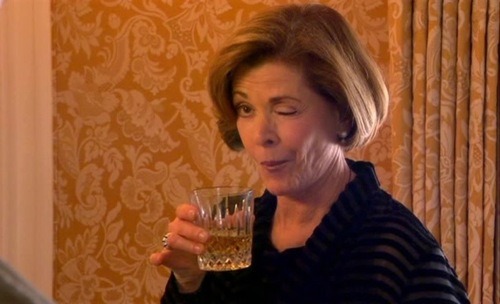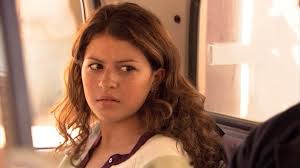Written by Lady T.
The fourth season of Arrested Development is in production, and fans are blueing themselves in delight. Every time I turn around, entertainment news is buzzing with more information about the show’s upcoming revival. Right after we fans calm down over our initial excitement at seeing Jason Bateman’s tweet of the first set photos, we hear more good news from David Cross as he hints at a longer season than originally planned.
It’s a good time to be an Arrested Development fan. I pulled out my season 1 DVDs the other day and watched the first two discs, and suddenly felt inspired to write about a topic that I’ve put on the back burner for too long: the women of the Bluth-Funke clan.
Arrested Development has three main female characters, outnumbered 2 to 1 by the main male characters, but they each lend their unique comic touch to the show and help make the Bluth family the wonderfully dysfunctional family they are.
The first main female character is the matriarch of the Bluth family, Lucille Bluth, who is probably the worst human being on the program.
 |
| Lucille Bluth (Jessica Walter) and the wink that makes her son uncomfortable |
|
|
|
Of all the dysfunctional, vain, shallow, spoiled members of the Bluth family, Lucille is the closest to being pure evil. Despite showing a glimpse of humanity here and there, she is ruthless, cruel, and enjoys playing favorites with her children. She constantly relies on Michael to get her out of any scrape the family gets into, mocks GOB and Lindsay and purposely reinforces their biggest insecurities, and clings to Buster to his own detriment. She’s a proud alcoholic and a racist – in fact, the only time she ever shows affection for her son GOB is when he makes a crack about “horny immigrants.” She’s mean and proud of it.
Classic line: “If that’s a veiled criticism of me, I won’t hear it, and I won’t respond to it.”
The feminist case for Lucille: I’ve seen too many family sitcoms where the mother and wife is portrayed as the most logical, sensitive, caring person, the glue holding the group together – endlessly patient except for the rare times when she’s not, the person who takes responsibility while the irresponsible man-children get to run around and have all the fun. Seeing Lucille reject that responsibility and use her influence for evil is so refreshing, and watching Jessica Walter tear into that role is a real treat. I rarely see an actress given the opportunity to enjoy playing an evil character to the extent that Walter does.
Lucille’s bad influence can be seen in her children, including her only daughter, Lindsay Funke.
 |
| Lindsay Funke (Portia de Rossi) in her infamous Slut shirt |
Of the Bluth children, Lindsay is the clear third favorite of her mother’s, slightly preferable to GOB, but below Michael and far below Buster. Lucille’s constant negative comments about Lindsay’s weight and appearance have left her insecure and determined to be a better person than her mother, but she doesn’t always succeed. Even though Lindsay is more conscious about social issues than her parents are, she’s also the biggest hypocrite in the family next to Michael. She fights for causes that she doesn’t quite understand, protesting against leather while still eating meat, fighting against circumcision and annoying the Jewish Defense League, and refusing to be objectified for her looks while feeling insulted that prison inmates don’t sexually harass her.
Classic line: “You know, we’re not the only ones destroying trees. What about beavers? You call yourself an environmentalist, why don’t you go club a few beavers?”
The feminist case for Lindsay: Lindsay is probably the only character on the show that would think to call herself a feminist, though she’d probably get the definition wrong and contradict herself several times while standing up for feminist beliefs. When there are very few feminist characters on television to begin with, Lindsay’s clueless activism could be interpreted as problematic, but the show is clear that Lindsay’s hypocrisy and shallowness are the problem, not the feminist/environmentalist ideals themselves. The joke is on her, not on her beliefs. Lindsay is also frequently put in the role of criticizing Michael’s hypocrisy, showing that she has some intelligence even underneath the shallowness, making her a more well-rounded character.
Like her mother, Lindsay is often neglectful of her own daughter,
Maeby Funke.
 |
| Maeby is confused, and not impressed. |
Maeby has a complicated relationship with her mother. While Lindsay often seeks Lucille’s approval only to get smacked down and criticized, Maeby tries to get any kind of attention (mostly negative) from her mother only to be ignored. In fact, Maeby is often overlooked and ignored by most of the members of the Bluth-Funke family – except for her cousin George Michael, who’s in love with her. This neglect leaves Maeby free to do whatever she wants, whether it’s skipping school, breaking into offices to steal evidence for her grandfather, or bluffing her way into the position of movie executive while she’s still in high school.
Classic line: “Marry me!”
The feminist case for Maeby: She might be the most underappreciated character on the show (or she was, until all of the “Call Me Maeby” song parodies came out), but I’ve always enjoyed the way Maeby combines cleverness and ignorance. She has almost no math skills or understanding of numbers, thinking that six twenty-dollar bills add up to $200, but she’s a master at manipulation. For two seasons, she manages to convince an entire movie studio that she’s an adult, and when her real age is eventually exposed, she still manages to work that to her advantage, making a made-for-TV movie about her life and tricking her family members into signing release agreements. When watching her effortlessly trick the people around her, the audience gets the impression that the Bluth family would have solved their problems long ago if anyone had bothered to consult their youngest member.
The Bluth-Funke women make up some of the most entertaining, well-rounded characters on television. They provide just as much laughs as the male characters on Arrested Development and help to dispel the ridiculous claims that “women aren’t funny.” I can’t wait to see what’s next for Lucille, Lindsay, and Maeby in season four. I’m blueing myself in anticipation.




Yes! I’m sooo excited too. I’ve watched the show at least three times, and I find new stuff to appreciate every time I watch it. I adore the women on the show. The women guest stars are especially hilarious, too!
Totally sublime. Arrested Development is one of the BEST television shows in the past 10 years, and one of the most sharply written and well-performed programs of all time. I CANNOT WAIT for the fourth season — rather than blueing myself, I will be cornhole-ing myself (but not in that way).
Thanks so much for this post; what a perfect addition to Bitch Flicks! Arrested Development deserves a lot more attention for its strong, hilarious and deeply flawed female characters.
Not all environmentalists are feminists. And the writers are the best and most daring in the business, so if they wanted to have feminism as a subject they would have. They were smart enough to avoid the unavoidable attacks from humorless feminists by not mentioning it.
Humorous characters require flaws. Feminists don’t have any.
At least they don’t think they do… and when you think about that, it’s kind of funny.